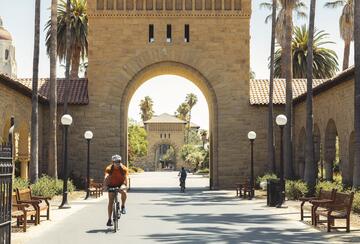News
The new project identifies solutions to the main challenges of moderating content online while respecting fundamental human rights.

Author Anne Stevenson-Yang exposes the unseen rural China and states that "the best corrective to misunderstandings about this “invisible China” is a book that came out in 2020 and remains the most important book on China in a decade: Invisible China, by Scott Rozelle and Natalie Hell."
A new piece in Brookings by Riana Pfefferkorn looks at anti-hacking laws

On the 20th anniversary of 9/11, four Stanford scholars and leading experts in national security, terrorism and contemporary conflict – Condoleezza Rice, Amy Zegart, Martha Crenshaw and Lisa Blaydes – reflect on how their teaching of the terrorist attacks has evolved.

Students with a strong interest in East Asia or international relations are especially encouraged to apply.
Three Stanford professors want people to press control-alt-delete on how we think about our relationship to Big Tech. In a new book, they seek to empower all of us to create a technological future that supports human flourishing and democratic values.
A new study has confirmed that surgical masks reduce the spread of COVID-19 and confirms the impact of mask-wearing on communities. For more, KCBS Radio's Margie Shafer spoke with Dr. Stephen Luby, Medical Epidemiologist and Professor of Medicine at Stanford University, senior author of the study.

"We now have evidence from a randomized, controlled trial that mask promotion increases the use of face coverings and prevents the spread of COVID-19," said Stephen Luby, MD, professor of medicine at Stanford and co-author of the study, in a press release.

The Center on Democracy, Development and the Rule of Law (CDDRL) is pleased to welcome six pre- and postdoctoral fellows who will be joining us for the 2021-22 academic year. These scholars will spend the academic year focusing on the Center's four program areas of democracy, development, evaluating the efficacy of democracy promotion, and rule of law.
Joshua Salomon and colleague Alyssa Bilinski write in this Health Affairs blog that there is an unmet need for a hybrid modeling approach: models that explore long-term questions, as in scenario models, but hew close to empirical data, as in forecasts.
Health experts are now recommending that clinicians begin screening patients for prediabetes and type 2 diabetes at age 35.
Stanford Health Policy celebrated the launch of the new Department of Health Policy on Sept. 1, 2021, as well as SHP Director Douglas K. Owens being named inaugural chair of the 13th basic sciences department within the School of Medicine.
In this New England Journal of Medicine perspective, SHP's Michelle Mello writes that more than 1,000 lawsuits have challenged public health orders shuttering business, banning indoor worship, restricting travel and mandating masks. She argues that the outcome of these cases will have a lasting impact on our public health.
Welcoming Kathryn Stoner and reflecting on six years as Mosbacher Director of the Center on Democracy, Development and the Rule of Law

Five Big Problems with Canada’s Proposed Regulatory Framework for “Harmful Online Content”
Article from Tech Policy Press by Daphne Keller

When President Biden announced that America would withdraw its troops from Afghanistan by the fall, he spoke of terrorism threats — but never mentioned Islamic State Khorasan, or ISIS-K, the Islamic State’s affiliate in Afghanistan.

Congratulations to the eight student honorees from Hiroshima Prefecture, Kawasaki City, Oita Prefecture, and Tottori Prefecture.
Putting Emotion Back Into 9/11
For coming generations of students, September 11 is history rather than memory. How does that affect how they learn about it?
![[Left] Kathryn Stoner; [Right] Encina Hall, Stanford University](https://fsi9-prod.s3.us-west-1.amazonaws.com/s3fs-public/styles/360x244/public/hero/stoner_encina_cddrl_hero.png?h=c4d9845d&itok=PWnek6yo)
Kathryn Stoner Named Mosbacher Director of the Center on Democracy, Development and the Rule of Law
Stoner, a Senior Fellow at the Freeman Spogli Institute for International Studies (FSI) and Professor of Political Science (by courtesy) at Stanford, will lead the Center’s efforts to understand how countries can overcome poverty, instability, and abusive rule to become prosperous societies.
A map of electric vehicle chargers shows one reason why. Most of America’s 107,000 gas stations can fill several cars every five or 10 minutes at multiple pumps. Not so for electric vehicle chargers – at least not yet.
In a new piece in the Financial Times, Marietje Schaake argues that protection for critical infrastructure is too often awarded using outdated criteria

President Volodymyr Zelensky visits Washington next week, with the highlight being a White House call on President Joe Biden. That offers the opportunity to reinvigorate the U.S.-Ukraine relationship at the highest level, following four years of Donald Trump.

With support from Shorenstein APARC’s Diversity Grant, coterminal student Ma’ili Yee (BA ’20, MA ’21) reveals how Pacific island nations are responding to the U.S.-China rivalry by developing a collective strategy for their region.

Thomas Wright and Colin Kahl detail the COVID-19 pandemic as the greatest shock to world order since World War II, with millions infected and killed, the worst economic crash since the Great Depression, and international institutions and alliances already under strain before the pandemic now teetering while the United States and China are careening toward a new Cold War.




![[Left to right]: Michael McFaul, Marshall Burke, Steven Pifer, Oriana Skylar Mastro, Didi Kuo, and Amichai Magen on stage.](https://fsi9-prod.s3.us-west-1.amazonaws.com/s3fs-public/styles/480x270/public/2024-10/fsi_reunion_2024_panel_hero.png?h=c4d9845d&itok=s9RgEIqP)











